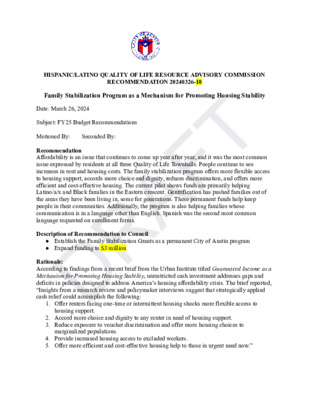HLQoL Commission_FY 24-25 Family Stabalization Program — original pdf
Backup

HISPANIC/LATINO QUALITY OF LIFE RESOURCE ADVISORY COMMISSION RECOMMENDATION 20240326-10 Seconded By: Motioned By: Date: March 26, 2024 Subject: FY25 Budget Recommendations Family Stabilization Program as a Mechanism for Promoting Housing Stability Recommendation Affordability is an issue that continues to come up year after year, and it was the most common issue expressed by residents at all three Quality of Life Townhalls. People continue to see increases in rent and housing costs. The family stabilization program offers more flexible access to housing support, accords more choice and dignity, reduces discrimination, and offers more efficient and cost-effective housing. The current pilot shows funds are primarily helping Latino/a/x and Black families in the Eastern crescent. Gentrification has pushed families out of the areas they have been living in, some for generations. These permanent funds help keep people in their communities. Additionally, the program is also helping families whose communication is in a language other than English. Spanish was the second most common language requested on enrollment forms. D R A F T Rationale: According to findings from a recent brief from the Urban Institute titled Guaranteed Income as a Mechanism for Promoting Housing Stability, unrestricted cash investment addresses gaps and deficits in policies designed to address America’s housing affordability crisis. The brief reported, “Insights from a research review and policymaker interviews suggest that strategically applied cash relief could accomplish the following: ● Establish the Family Stabilization Grants as a permanent City of Austin program ● Expand funding to $3 million 1. Offer renters facing one-time or intermittent housing shocks more flexible access to Description of Recommendation to Council 2. Accord more choice and dignity to any renter in need of housing support. 3. Reduce exposure to voucher discrimination and offer more housing choices to housing support. marginalized populations. 4. Provide increased housing access to excluded workers. 5. Offer more efficient and cost-effective housing help to those in urgent need now.” According to UpTogether’s Central Texas 12-Month Pilot of the Strength-Based Approach: Final Report, “Between July 2021 and March 2022 members decreased their reliance on government subsidies. Fewer members applied for subsidies, vouchers, or other similar housing assistance (from 27% to 19%). The percentage of members receiving any type of government housing assistance was cut by half (16% to 8%).” Cash is an efficient and equitable form of housing assistance. UpTogether uncovered on a previous report that only 16% of members were receiving housing assistance. Some of the highlighted barriers members faced when applying or receiving other types of government assistance included long waiting periods before receiving subsidies, too many requirements, or encountering a benefits cliff. The Final Report also showed not having to worry about eviction or next month’s rent payment reduced stress and allowed families to focus on goal attainment instead of short-term survival. In May 2022, the City of Austin approved a $1.18 million pilot with UpTogether using general funds. In approving the pilot, the City Council directed that it should emphasize areas of key priority to the City in the selection process including homelessness and displacement, as they consider this approach as a way to impact outcomes in these areas. Ten community organizations, selected for their existing relationships with the primary audience, identified the 135 households in August 2022. Households received their first payment in September 2022, and they received their final payment in August 2023. A final findings report with fact sheets will be published in the Summer 2024. D R A F T Information from the City of Austin Guaranteed Income Pilot Status Update dated February 2023 includes demographic information for those in the pilot: Additionally, information was broken down by Council District and Zip Code. Out of 115 families, 12% reside in 78741, 10% in 78753, and 10% in 78744. Out of 67 families, 24% reside in District 1, 16% in District 2, 18% in District 3, and 19% in District 4. According to the Urban Institute report titled Austin Guaranteed Income Pilot: Participant Outcomes at 12 Months and dated January 2024, “Participants reported spending, on average, more than 50 percent of their pilot cash to cover financially burdensome housing costs. The average share of cash spent on housing increased between the 6- and 12-month mark and was more than twice as high as spending in any other top category.” The following chart includes information regarding UpTogether participants’ housing stability compared with others: A Fiscal Year 24 budget amendment allocated $1.3 million to extend the pilot and create the Family Stabilization Grant Program. Staff anticipates the program to begin spring 2024. The City of Austin and Austin City Council continue to recognize the benefits the Family Stabilization Program has on individuals and the community as a whole. D R A F T Vote For: Against: Abstain: Absent: Attest: Commissioner Neri, Commissioner Silva, Commissioner Afifi, Commissioner Vargas, Commissioner Perales, Commissioner Castañeda, Commissioner Galvan, Commissioner Jackson Jr., Commissioner May, Commissioner Vigil, Commissioner Maldonado Amanda Afifi, Chair Urban Institute Guaranteed Income as a Mechanism for Promoting Housing Stability - https://www.urban.org/sites/default/files/2022-12/Guaranteed%20Income%20as%20a%20Mechanism%2 0for%20Promoting%20Housing%20Stability.pdf Urban Institute Austin Guaranteed Income Pilot: Participant Outcomes at 12 Months - https://www.urban.org/sites/default/files/2024-01/Austin_Guaranteed_Income_Pilot_Participant_Outcom es_at_12_Months.pdf D R A F T